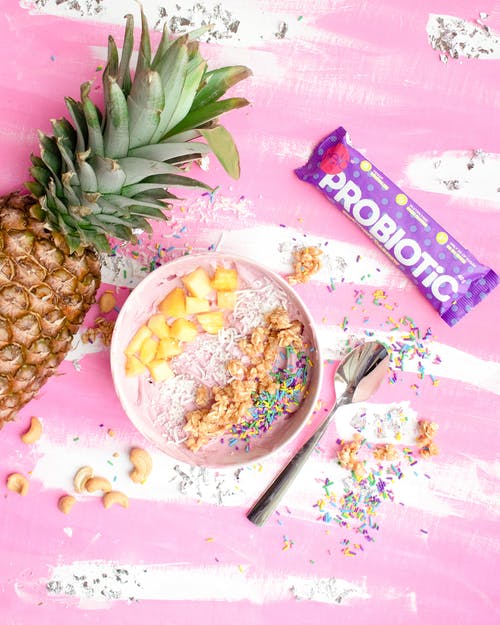Probiotics: Not just a mere food supplement
Gunjan Sachdeva
 Credits: Karley Saagi, Pexels
Credits: Karley Saagi, Pexels
Probiotics have risen in popularity in recent years as a result of growing scientific evidence demonstrating their favourable effects on human health. This article highlights recent probiotic studies on Alzheimer's disease.
Tweet
Probiotics have been commonly used as dietary supplements since olden days. They occur naturally in various fermented foods, such as yogurt, kimchi and sourdough bread. Probiotics are living microbes that are good for our overall health. They operate by competing out harmful bacteria, occupying space and depleting the resources pathogens need to reproduce. They produce a variety of beneficial molecules along the digestive tract that nourish gut cells and assist in the creation of the gut barrier, which prevents disease-causing bacteria from travelling to other parts of the body. A team of scientists have revealed interesting findings regarding the anti-Alzheimer properties of Lactobacillus plantarum (a probiotic).
In 1965, Lilly and Stillwell coined the term ‘probiotic’ to describe "the growth-promoting substances generated by microbes." Following that, several scientists came up with their own definitions of probiotics. In 2012, the World Health Organisation (WHO) defined probiotics as "microbial cells that, when provided in suitable proportions, impart a benefit to the host".
In a research it has been revealed that the Lactobacillus genus of bacteria contains the majority of strains that have the potential to help with antibiotic-associated diarrhoea, inflammatory bowel disease of the intestine, gut microbe’s restoration and irritable bowel syndrome.
Lactobacillus plantarum displayed anti-Alzheimer properties when tested against Alzheimer's disease (AD) caused due to excess of D-galactose.D-galactose is found in large quantities in milk, vegetables, and fruits. Prolonged D-galactose intake tends to interact with proteins present in our body resulting in the formation of unstable compounds which can have disastrous consequences. Alzheimer's disease is a neurodegenerative ailment in which brain functioning is impeded by the death of brain cells, and the patient experiences memory loss as well as loss of coordination in other mental processes. This disease mostly affects those over the age of 65.
 Credits: Nathan Dumlo, Pexels
Credits: Nathan Dumlo, Pexels
Researchers from both studies within an organism and outside a living organism discovered that L. plantarum can produce signals from the brain to various parts of the body that are vital for brain functioning. Furthermore, in rat brains affected by Alzheimer disease, this probiotic showed a positive effect on the transport of numerous proteins across the brain. Additionally, this probiotic can protect AD-induced rats from excess free radicals generated in the body that can damage proteins, cells and DNA, indicating its antioxidant properties. A research carried out by Mallikarjuna, who is a research scholar at Sri venkateswara University, Tirupati, used these features of L. plantarum to test for its anti-Alzheimer effects.
Results showed that the L. plantarum probiotic can improve behavioural activity and learning skills in Alzheimer’s patients by increasing brain signalling activity in the hippocampus (involved in memory) and cerebral cortex (awareness, perception) regions of the brain, as well as restoring the brain abnormalities to normal levels. However, it is unclear whether L. plantarum can restore the changes ( loss of beneficial microorganisms) that occur in the intestine after encountering Alzheimer's disease. More research is needed to fully understand the positive effects of Lactobacillus bacteria for treating various disorders.
All of these exploratory data indicate that L. plantarum probiotic has an anti-Alzheimer’s impact against D-Galactose-induced Alzheimer's disease.
Bibliography
Gunjan Sachdeva, recently completed her post graduation in Biotechnology from Delhi Technological University. She is an introvert who keeps herself occupied with a variety of activities such as painting, penning quotations, tales (authored a book “Joy in a Coin”) and, most importantly, composing poems. She had not only limited herself to these pastimes, but has now also taken up cooking and dancing in her spare time.
Her Curiosity has remained associated with academics, and she adds that curiosity is what transforms us from ordinary people to remarkable personalities, therefore one should always have it, whether in academics or non-academics. Now she is planning to go for higher studies in her dream subject. Thanks for reading !
This article was submitted by Gunjan Sachdeva as an assignment during the workshop Scicomm for Scientists 2021, organised by Cogito137, IISER Kolkata, funded by the Department of Science and Technology, Govt. of India. The assignment was selected for publication and has undergone due editorial process. Team Cogito137 thanks Spoorthy Raman for the initial editorial review of this article.
signup with your email to get the latest articles instantly